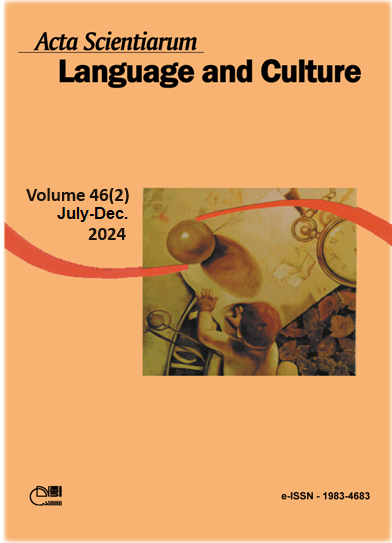Atitudes e percepções sobre linguagem inclusiva e pronomes não-binários: um estudo diagnóstico com falantes brasileiros
Resumen
No intuito de debater o condicionamento das normas sociais na implementação de novas formas linguísticas em uma comunidade de fala, discuto no presente trabalho a relação entre as atitudes de uma amostra de falantes do português brasileiro diante da plausibilidade da adoção de estratégias para uma linguagem não-binária, abarcando-se a possibilidade de inserção na gramática desta língua de neopronomes, e suas percepções sobre essa mesma linguagem. Com respaldo na ideia de que em todas as sociedades circulam ideologias linguísticas, entendidas como compreensões socialmente incorporadas sobre a natureza, a estrutura e os usos linguísticos, parto da premissa sociolinguística da percepção enquanto julgamento do interlocutor, ao correlacionar fatores sociais a traços sociolinguísticos, constituindo um padrão de consciência social na comunidade. E, por seu turno, atitudes enquanto reações, positivas ou negativas, desse interlocutor diante da possibilidade de implementação de novas formas pronominais para gênero. A discussão parte de um experimento piloto offline feito com 144 participantes, que responderam a um questionário online contendo questões sobre (a) seu perfil social, (b) suas percepções quanto ao uso dos pronomes canônicos de terceira pessoa, os quais exprimem marca de gênero na língua, (c) suas percepções sobre mudança linguística e gênero gramatical, e, por fim, (d) sua opinião diante do uso de pronomes não-binários. Os resultados da amostra demonstram divergência entre suas atitudes, motivadas por ideologias linguísticas conservadoras, e suas percepções linguísticas, que tenderam a ser progressistas.
Descargas
Citas
Referências
Bagno, M. (2002). Língua, história e sociedade: breve retrospecto da norma-padrão brasileira. In M. Bagno (Org.), Lingüística da norma (p. 179-199). São Paulo, SP: Loyola.
Carvalho, D. S. (2016). Elementos para a gramaticalização de nego no português do Brasil. Acta Semiótica et Linguística, 21, 55-72.
Carvalho, D. S. (2020). As genitálias da gramática. ABRALIN, 19(1), 1-21. DOI: https://doi.org/10.25189/rabralin.v19i1.1693
Carvalho, D. S. (2021). A domesticação da gramática de gênero. Campinas, SP: Pontes.
Carvalho, D. S. (2022). Quem é êla? A invenção de um pronome não-binário. In F. R. Barbosa Filho & G. Á. Othero (Eds.), Linguagem ‘neutra’: língua e gênero em debate (p. 119-139). São Paulo, SP: Parábola.
Carvalho, V. (2010). Você, a gente et alia indeterminam o sujeito em Salvador (Dissertação de Mestrado). Universidade do Estado da Bahia, Salvador.
Da Valéria, P., & Adan, C. (1997). Nêga Vá. In É o Tchan do Brasil. Rio de Janeiro, RJ: Polygram.
Derrida, J. (1975). Le facteur de la vériteé Poétique. Revue de Théorie et d’Analyse Littéraires, 21, 96-147.
Derwing, B., & Almeida, R. G. (2005). Métodos experimentais em Lingüística. In M. Maia & I. Finger (Eds.), Processamento da Linguagem (p. 401-442). Pelotas, RS: Educat.
Foucault, M. (2001). A ordem do discurso. São Paulo, SP: Loyola.
Freitag, R. M. K. (2016). Uso, crença e atitudes na variação na primeira pessoa do plural no português brasileiro. DELTA: Documentação de Estudos em Linguística Teórica e Aplicada, 32(4), 889-917. DOI: https://doi.org/10.1590/0102-44506992907750337
Freitag, R. M. K. (2024). Não existe linguagem neutra! Gênero na sociedade e na gramática do português brasileiro. São Paulo, SP: Contexto.
Freitag, R. M. K., & Santos, A. O. (2016). Percepção e atitudes linguísticas em relação às africadas pós-alveolares em Sergipe. In N. S. Lopes, S. S. F. Araújo, & R. M. K. Freitag (Eds.), A fala nordestina: entre a sociolinguística e a dialetologia (p. 109-122). São Paulo, SP: Blucher.
Freitag, R. M. K., & Siqueira, M. (2018). Ainda sobre possessivos de terceira pessoa no português. Caderno de Squibs: Temas em Estudos Formais da Linguagem, 4(2), 32-44.
Gal, S. (2023). Language ideologies. Oxford Research Encyclopedia of Linguistics. DOI: https://doi.org/10.1093/acrefore/9780199384655.013.996
Hawkey, J. (2016). Developing discussion of language change into a three-dimensional model of linguistic phenomena. Language and Linguistics Compass, 10(4), 176-190.
Higgins, E. T., & Bargh, J. A. (1987). Social cognition and social perception. Annual Review of Psychology, 38, 369-425. DOI: https://doi.org/10.1146/annurev.ps.38.020187.002101
Labov, W. (1972). Sociolinguistic patterns. Pennsylvania: University of Pennsylvania Press.
Lambert, W. E. (1967). A social psychology of bilingualism. Journal of Social Issues, 23(2), 91-109. DOI: https://doi.org/10.1111/j.1540-4560.1967.tb00578.x
Lambert, W. W., & Lambert, W. E. (1972). Psicologia social (3a ed.). Rio de Janeiro, RJ: Zahar.
Lima, T. J. S., Souza, L. E. C., & Modesto, J. G. (2023). Atitudes. In A. R. R. Torres, M. E. O. Lima, E. M. Techio, & L. Camino. Psicologia social: temas e teorias (p. 171-202). São Paulo, SP: Blucher.
Lima, V. M. L. M., & D’Amorim, M. A. (1986). A relação atitude-comportamento à luz da Teoria da Ação Racional. Arquivos Brasileiros de Psicologia, 38(1), 133-142.
Macrae, C. N., & Bodenhausen, G. V. (2001). Social cognition: categorical person perception. British Journal of Psychology, 92(1), 239-255. DOI: https://doi.org/10.1348/000712601162059
Oliveira Jr., M. (2019). NURC 50 anos. São Paulo, SP: Parábola.
Rey, A. (2001). Usos, julgamentos e prescrições lingüísticas. In M. Bagno (Org.), Norma linguística (p. 113-140). São Paulo, SP: Loyola.
Silverstein, M. (1985). Language and the culture of gender: at the intersection of structure, usage, and ideology. In E. Mertz & R. J. Parmentier (Eds.), Semiotic mediation: sociocultural and psychological perspectives (p. 219-259). Orlando, FL: Academic Press.
Weinreich, U., Labov, W., & Herzog, M. I. (1968). Empirical foundations for a theory of language change. In W. P. Lehmann & Y. Malkiel (Eds.), Directions for Historical Linguistics (p. 95-195). Austin: University of Texas Press.
DECLARAÇÃO DE ORIGINALIDADE E DIREITOS AUTORAIS
Declaro que o presente artigo é original, não tendo sido submetido à publicação em qualquer outro periódico nacional ou internacional, quer seja em parte ou em sua totalidade.
Os direitos autorais pertencem exclusivamente aos autores. Os direitos de licenciamento utilizados pelo periódico é a licença Creative Commons Attribution 4.0 (CC BY 4.0): são permitidos o acompartilhamento (cópia e distribuição do material em qualqer meio ou formato) e adaptação (remix, transformação e criação de material a partir do conteúdo assim licenciado para quaisquer fins, inclusive comerciais.
Recomenda-se a leitura desse link para maiores informações sobre o tema: fornecimento de créditos e referências de forma correta, entre outros detalhes cruciais para uso adequado do material licenciado.




















6.png)









